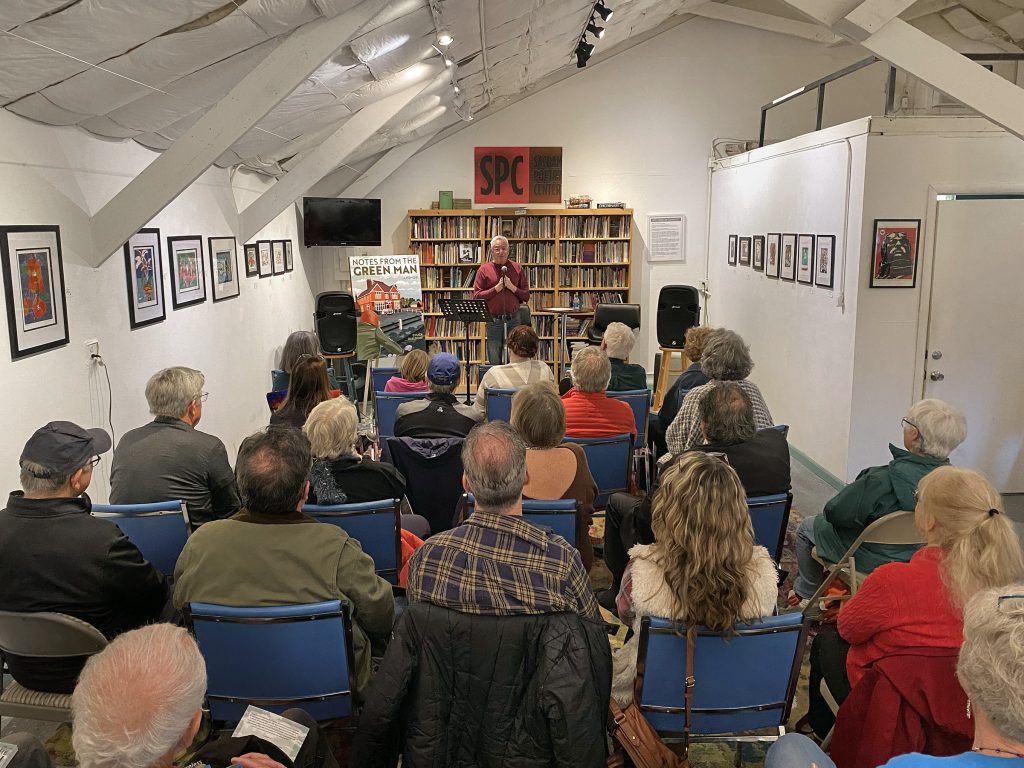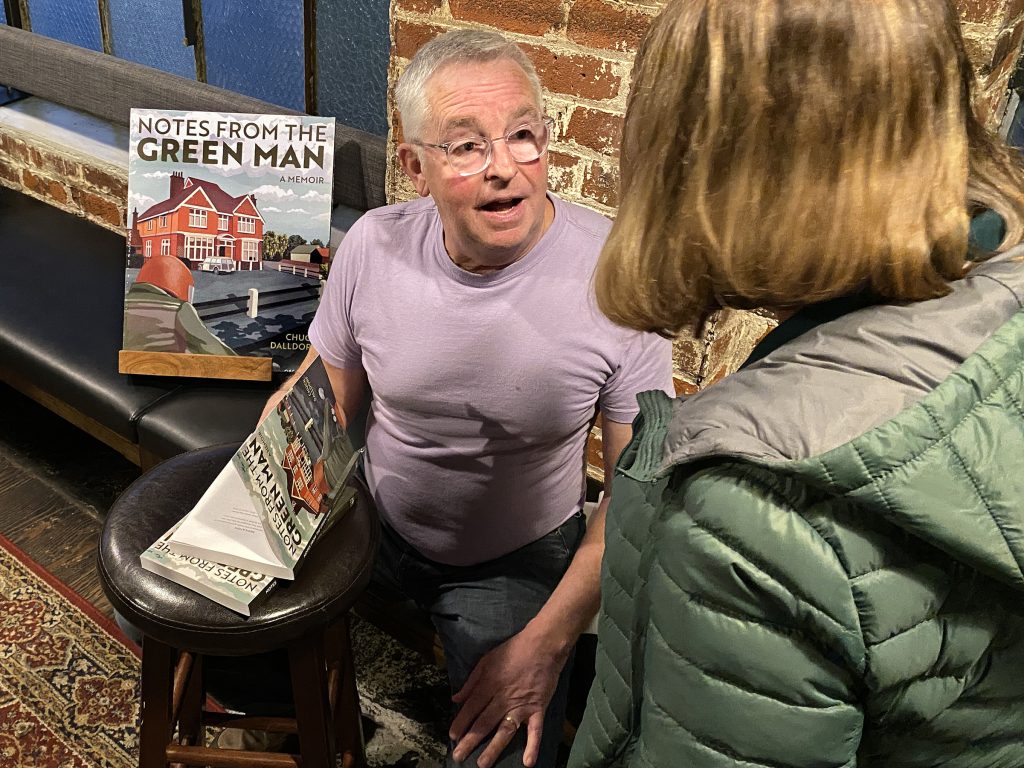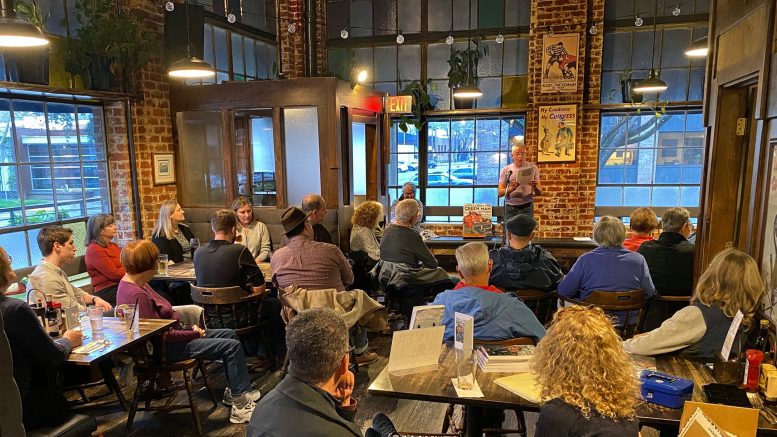Local hybrid-press releases memoir exploring one man’s journey through public house connections – and across the pond and back
By Casey Rafter
On a morning like this, Fox & Goose is usually quiet. The first hour or so of the pub’s business is a manifestation of Sacramentans on their day off, local pseudo-celebrity sightings or freelancer writers meeting to talk business.
One author who’s sitting among the faded bricks is Chuck Dalldorf. He’s experienced plenty of ups and downs while sitting at tables in this storied local pub. And he’s also seen plenty of things long before he ever discovered the Fox & Goose.
The tale starts with Dalldorf leaving his childhood home of Brooklyn at 17 to join the Army. It was 1977, some three years after Dalldorf’s writing hero, Kurt Vonnegut, won the Hugo Award for “Slaughterhouse-Five” and just months after one of his favorite bands, Queen, issued its famous “A Day at the Races.” It was a moment of big ideas, big sound and big hair, but Dalldorf was about to absorb it all through the prism of an odyssey: That’s the fuel of his new memoir “Notes from the Green Man,” which covers his life from being stationed at RAF Bentwaters and its twin base, RAF Woodbridge, to his eventual transfer to Mather Air Force Base in 1981.
The biggest presence in the book isn’t Dalldorf at all, though its story is told through his eyes. The main character is the titular Green Man pub in southeast England, where Dalldorf spent a significant amount of time soaking in the village of Tunstall in Suffolk. That’s where the Green Man was located — and is still today under new ownership and design. By weaving together anecdotes of his time in Suffolk, Dalldorf looks to share an intimate journey that is more pleasant than it is sorrowful.
“The story is almost like a stone skipping over time,” Dalldorf said. “I really wanted to convey this love of a place and the people, coupling those two together. And then the place, the people and the time. It’s those three factors that intersect that made it such an astonishing experience.”
The book was released by a small independent hybrid Sacramento publisher, River Rock Books, just about two months ago. One of the publisher’s co-founders, Jan Haag, was Dalldorf’s Sacramento State University instructor in the mid-1980s, teaching a ‘writing for publication’ class that he attended. The material Dalldorf created during that course became one of the most impactful anecdotes in “Notes from the Green Man.”
“One of the assignments was a first-person essay, and he wrote a version of the story in that book about his colleague named ‘Shorty,’” Haag recalled years later.
The “Shorty” of the story was James Short, a fellow that Dalldorf knew from training back in the states, who came to a tragic end when a fuel tank inspection led to an explosion that ended his life. It also left two other airmen with severe burns, according to Dalldorf.
In the decades that followed their initial interaction, Haag and Dalldorf kept in touch, with the latter continuing to share stories and anecdotes from his time in Suffolk. Haag told SN&R that River Rock Books is based on the notion of publishing “books we love by people we love.” When it came to reflections on Shorty and the Green Man, the decision to bring out Dalldorf’s story was an easy thing to say ‘yes’ to.
“I’ve long had a feeling for that part of England,” Haag observed. “I’d been hearing about these stories for years; and I’d say, ‘You gotta get some of these written down…keep going … just one anecdote at a time with as much detail as you can.”

The vignettes shared in Dalldorf’s book are contemplative and often humorous. One character that brings smiles, and eventual melancholy, to the tone is Fred the pub dog. The book recounts how, even as a sizable Labrador Retriever, Fred could snake between stools and legs to quietly steal sausage rolls from drink-tipping patrons. Dalldorf uses Fred’s short life as a window onto the pub’s collective emotional life and sense of community.
“He died in such a beautiful Suffolk way,” the writer remembered. “If I could go out that way, it sounds pretty good to me.”
The contrast between time spent as a young US Army man working on Cold War-era aircraft at a British airbase nearly 400 miles from home, juxtaposed to Dalldorf’s escape on bicycle to the landscape, pub regulars and local farmers of rural Suffolk, is the main tension of “Notes from the Green Man” – a dynamic of opposing forces that surround a man contemplating peace in the world and searching for it in himself.
The author recalls that being a cold warrior was no slouch assignment: He learned every aspect of each craft he worked on. Dalldorf also admits he would not have written about the airfields at all if they weren’t necessary to stitch together the two worlds that existed in his Suffolk experience.
“I’d be on the base working and, when I’d get off base, I’d be so relieved and so happy,” he admitted. “It felt like that every day. Every day, as soon as I cleared that gate … I can take a breath. Getting back to the base would be like getting your head back in the ballgame.”
Near the conclusion of “Notes from the Green Man,” it’s July 1981 and Dalldorf finds himself transposed from the oft-gloomy climate of Suffolk to a summer-cursed Sacramento. Moving to Mather Air Force Base during the hottest time of the year meant being careful about touching the planes. If unprotected flesh touched their metal, it would literally prompt seeking medical attention. At that temperature, the planes’ exteriors were so hot they were dangerous.
“Sacramento was such a different place,” Dalldorf acknowledged, noting a significant increase in population he’s seen since first arriving. This late part of his memoir describes a day of bicycling off base for more mental escape. This time, after a nearly 13-mile journey along the American River, Dalldorf paused on R Street in front of the Fox and Goose pub.
“R Street was dead,” Dalldorf said, looking back. “There were still real train tracks. Some nights you’d be standing at the bar and you’d hear this big noise outside, and all of a sudden there’d be these lights – and it was two guys with headlamps, shouting, ‘Who the hell parked on the tracks?’”

When Dalldorf first entered Fox & Goose — which opened 1975, modeled after owner Bill Dalton’s hometown pub in Yorkshire — he felt a familiar character to the pub that washed over him, just like he’d felt during each visit to The Green Man.
Not much has changed in the place since Dalldorf’s first visit, other than the patina of decades from spilled beer, steamy food vapors and floorboards worn from acoustic sets and open mic nights. For Dalldorf, that’s a timeline rife with memories.
“I think you can underestimate having a touchstone place, and that is my place,” he said of Fox & Goose. “I’ve gotten job offers there; I’ve lost jobs while I’m there; and gained wives there. I’ve lost wives there. You know, we’ve had this whole spectrum of my Sacramento life.”


Enjoyed the story about Chuck Dalldorf. It brought memories back to me of my time as a U.S. Navy man stationed on a Royal Air Force base near a small town in rural Scotland in the 1970’s. I quickly became immersed in the local pub scene. Less than a few days after my arrival in Sacramento I discovered the Fox & Goose and became a long-time regular (although not so much so these days). I became a bartender there working for Bill (who I still see from time to time) & Denise about 2 years after I arrived. Tell Chuck I’d enjoy sharing a pint or two with him there some time.